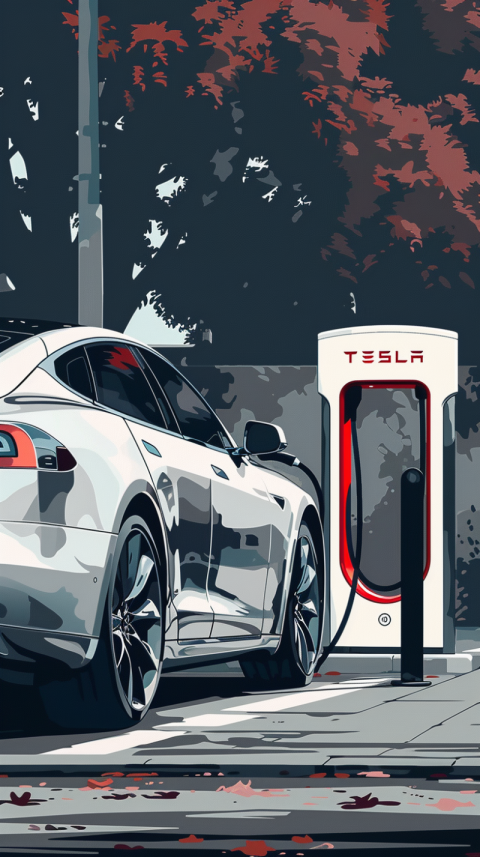











The Future is Here: Discover the Electric Car Revolution
The automotive industry is undergoing a profound transformation, driven by the rise of electric cars (EVs). No longer a niche product, EVs are rapidly gaining mainstream adoption, propelled by advancements in battery technology, growing environmental concerns, and increasing government support. This comprehensive guide will delve into every aspect of electric cars, exploring their benefits, challenges, and the exciting future they promise.
1. The Rise of Electric Cars: A Historical Perspective
The concept of electric vehicles is not new. In fact, electric cars were among the earliest automobiles, predating even the internal combustion engine (ICE) vehicles that dominated the 20th century.
- Early Days (Late 19th - Early 20th Century): Electric cars were popular due to their quiet operation and lack of emissions. However, limitations in battery technology and the rise of affordable gasoline-powered cars led to their decline.
- The Resurgence (Late 20th - Early 21st Century): Growing concerns about air pollution and oil dependence, coupled with advancements in battery technology, sparked renewed interest in EVs. Companies like Tesla, Nissan, and Chevrolet played a pivotal role in popularizing modern electric cars.
- The Present and Future: Today, nearly every major automaker offers electric car models. Governments worldwide are implementing policies to encourage EV adoption, and the charging infrastructure is expanding rapidly. The future of transportation is undoubtedly electric.
2. Understanding Electric Car Technology
Electric cars are powered by an electric motor instead of an internal combustion engine. The electric motor draws energy from a large battery pack typically located under the vehicle's floor. Here's a breakdown of the key components:
- Electric Motor: Converts electrical energy into mechanical energy to propel the vehicle. EVs often have instant torque, resulting in rapid acceleration.
- Battery Pack: The heart of an EV, storing the electrical energy. Lithium-ion batteries are the most common type, offering high energy density and relatively long lifespans.
- Onboard Charger: Converts AC power from a home or public charging station to DC power to charge the battery.
- Power Electronics Controller: Manages the flow of electricity between the battery and the motor, controlling the speed and torque of the vehicle.
- Regenerative Braking: A system that captures kinetic energy during braking and converts it back into electricity, extending the vehicle's range.
3. Types of Electric Cars
There are several types of electric vehicles, each with its own level of electrification:
- Battery Electric Vehicles (BEVs): Purely electric cars that run solely on battery power. Examples include the Tesla Model S, Nissan Leaf, and Chevrolet Bolt EV.
- Plug-in Hybrid Electric Vehicles (PHEVs): Combine an electric motor and a gasoline engine. They can run on electric power for a limited range before switching to the gasoline engine. Examples include the Toyota Prius Prime and Chevrolet Volt.
- Hybrid Electric Vehicles (HEVs): Have both an electric motor and a gasoline engine, but they cannot be plugged in. The electric motor assists the gasoline engine, improving fuel efficiency. The Toyota Prius is a well-known example.
- Fuel Cell Electric Vehicles (FCEVs): Use hydrogen fuel cells to generate electricity, emitting only water vapor. These are still in the early stages of development.
4. Benefits of Electric Cars
Electric cars offer a multitude of advantages over traditional gasoline-powered vehicles:
- Environmental Benefits:
- Zero tailpipe emissions: EVs produce no direct greenhouse gases or pollutants, contributing to cleaner air and a healthier environment.
- Reduced carbon footprint: Even when considering the electricity generation process, EVs generally have a lower carbon footprint than ICE vehicles, especially when powered by renewable energy sources.
- Economic Benefits:
- Lower running costs: Electricity is typically cheaper than gasoline, resulting in significant savings on fuel costs.
- Reduced maintenance: EVs have fewer moving parts than ICE vehicles, leading to lower maintenance costs.
- Government incentives: Many countries offer tax credits, rebates, and other incentives to encourage EV adoption.
- Performance Benefits:
- Instant torque: Electric motors provide instant acceleration, making EVs quick and responsive.
- Quiet operation: EVs are significantly quieter than gasoline cars, reducing noise pollution.
- Smooth ride: The absence of a traditional transmission results in a smoother and more refined driving experience.
5. Charging Your Electric Car
Charging infrastructure is a crucial aspect of EV ownership. There are three main levels of charging:
- Level 1 Charging: Uses a standard household outlet (120V). It's the slowest charging method, adding about 2-5 miles of range per hour.
- Level 2 Charging: Uses a 240V outlet (similar to a clothes dryer). It's the most common type of home charging, adding about 10-25 miles of range per hour.
- Level 3 Charging (DC Fast Charging): Uses high-voltage DC power to charge the battery rapidly. It can add hundreds of miles of range in under an hour. Typically found at public charging stations.
6. The Future of Electric Cars
The electric car revolution is just beginning. Here are some key trends shaping the future of EVs:
- Battery Technology Advancements: Ongoing research is focused on developing batteries with higher energy density, faster charging times, and longer lifespans. Solid-state batteries are a promising technology that could revolutionize the EV industry.
- Expanding Charging Infrastructure: Governments and private companies are investing heavily in expanding the public charging network, making it more convenient to charge EVs on the go.
- Autonomous Driving Integration: Electric cars are often at the forefront of autonomous driving technology. The integration of these two technologies will further transform the transportation landscape.
- Vehicle-to-Grid (V2G) Technology: V2G technology will allow EVs to feed electricity back into the grid, providing grid stability and potentially generating revenue for EV owners.
- Increased Affordability: As production volumes increase and battery costs decline, electric cars are becoming more affordable for a wider range of consumers.
7. Popular Electric Car Models
The EV market is rapidly expanding, with new models being introduced regularly. Some of the most popular and highly regarded electric cars include:
- Tesla Model S, 3, X, Y: Tesla is a pioneer in the EV industry, offering a range of high-performance electric cars with long ranges and advanced technology.
- Nissan Leaf: One of the first mass-market EVs, the Nissan Leaf is known for its affordability and practicality.
- Chevrolet Bolt EV: The Bolt EV offers a long range and a spacious interior at a competitive price.
- Ford Mustang Mach-E: Ford's first all-electric SUV, the Mustang Mach-E combines performance, style, and practicality.
- Hyundai Kona Electric: A popular choice in the compact SUV segment, the Kona Electric offers a long range and a comfortable ride.
- Kia Niro EV: Similar to the Hyundai Kona Electric, the Niro EV is a well-rounded electric SUV with a good range and a spacious interior.
8. Addressing Common Concerns About Electric Cars
Despite the many benefits of EVs, some consumers still have concerns:
- Range Anxiety: The fear of running out of battery power before reaching a charging station. This is becoming less of an issue as EV ranges increase and the charging infrastructure expands.
- Charging Time: While charging times are longer than refueling a gasoline car, Level 3 DC fast charging can significantly reduce charging times.
- Battery Life: Modern EV batteries are designed to last for many years and hundreds of thousands of miles. Most manufacturers offer warranties on their battery packs.
- Initial Cost: The upfront cost of an EV can be higher than a comparable gasoline car, but government incentives and lower running costs can offset this difference over time.
Conclusion
Electric cars represent a significant step towards a more sustainable and efficient transportation future. With their environmental benefits, economic advantages, and performance capabilities, EVs are rapidly gaining popularity and reshaping the automotive landscape. As battery technology continues to improve, charging infrastructure expands, and costs decrease, the electric car revolution will only accelerate, paving the way for a cleaner, quieter, and more exciting driving experience.
electric car benefits, electric car range anxiety, electric car charging stations near me, how long does it take to charge an electric car, how much does it cost to charge an electric car, best electric cars 2023, affordable electric cars, electric car tax credit, electric car battery life, electric car vs gas car, long range electric cars, used electric cars for sale, electric car maintenance costs, hybrid vs electric car, types of electric cars, electric car government incentives, electric car technology explained, electric car charging infrastructure, electric car performance, electric car environmental impact

